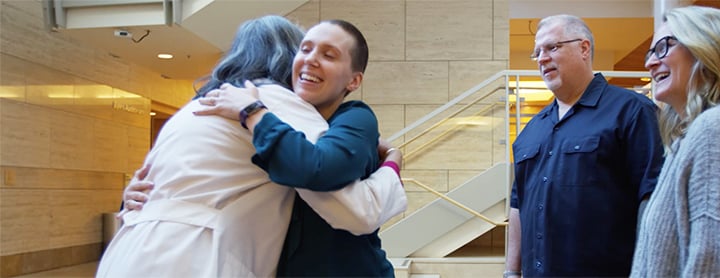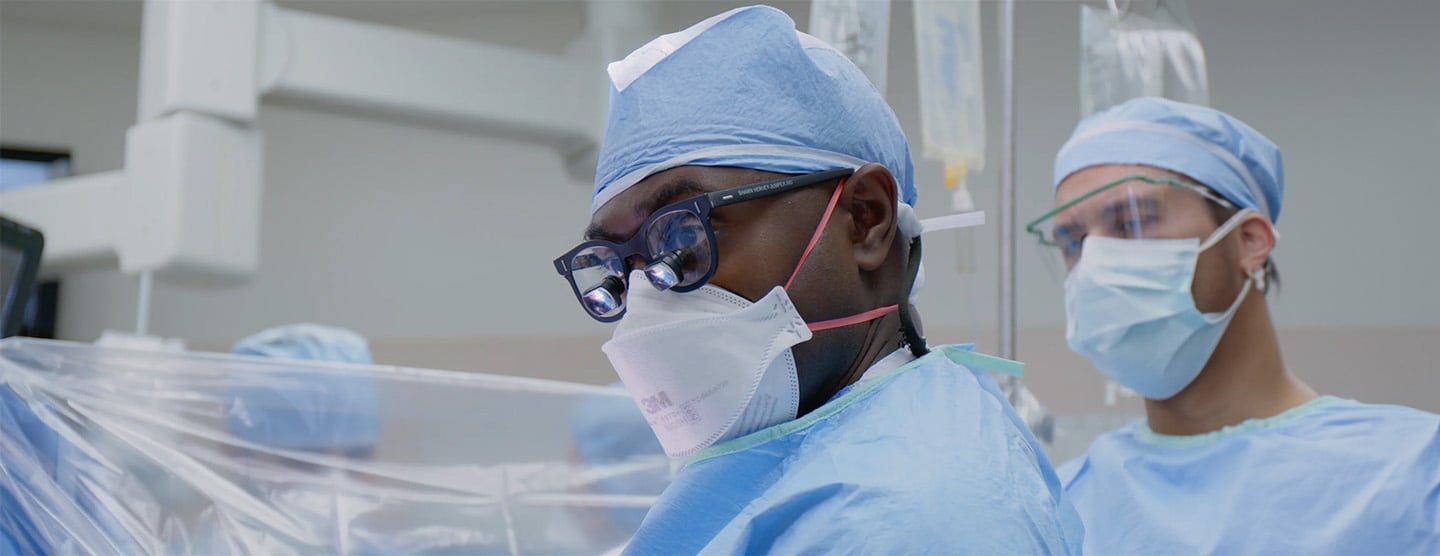
Brain Tumor Center
The UCSF Brain Tumor Center is one of the largest and most comprehensive programs in the nation for the treatment of brain and spinal tumors. We treat all grades of tumors, whether newly diagnosed or recurring after previous treatment. We also offer specialized care for patients with CNS metastases, tumors that have spread to the central nervous system. Our team brings together neurosurgeons, neuro-oncologists, radiation oncologists and radiologists, as well as other health professionals with expertise in these conditions.
Our mission is to provide our patients with the best possible outcomes and quality of life, using the latest treatments and technology. These include advanced intra-operative imaging and brain mapping techniques to protect areas of the brain used for language, motor skills and sensory function during surgery, as well as radiosurgery with Gamma Knife and CyberKnife and access to clinical trials of promising new therapies.
Our comprehensive approach includes a caregiver program, dedicated to helping our patients' caregivers and family members get the resources and support they need.
We are part of the UCSF Weill Institute for Neurosciences.
Learn more about clinical trials and how they work.
Our locations
Patient education
Brain tumor patient and family resource guide
The diagnosis of a brain tumor affects your life in many ways. Our guide can help you cope.
Explore what we do
Brain tumor tests lead to better outcomes
Using new tools for more precise diagnoses and treatments, the UCSF Brain Tumor Center helps patients like Kelly live longer.
Support services
Our team
Clinical trials
Stereotactic Radiosurgery and Immunotherapy (Pembrolizumab) for the Treatment of Recurrent Meni...
Percentage of patients who are progression-free at the landmark of 12 months from start of treatment based on the target lesion(s) that are receiving radiation treatment will be reported. Tumor progression will be assessed using I...
Recruiting
Hyperpolarized Imaging in Diagnosing Participants With Glioma
Adverse events will be monitored from just before investigational medicinal product (IMP) administration until the end of study participation. Vital signs (blood pressure and heart rate only) will be recorded at baseline and 30 mi...
Recruiting
Serial MR Imaging and MR Spectroscopic Imaging for the Characterization of Lower Grade Glioma
Safety evaluation for endpoint will include monitoring for the occurrence of treatment-emergent adverse events (AEs). Reported toxicities will be graded using the National Cancer Institute (NCI) Common Terminology (Toxicity) Crite...
Recruiting
Behavioral Health Evaluation and Intervention Program for Patients Undergoing Craniotomy
The proportion of enrolled patients that complete all three virtual behavioral health counseling sessions from time of study enrollment to the final behavioral health counseling session, approximately 6-9 months following the part...
Recruiting
Optic Nerve Stimulation To Prevent Visual Deficits After Endoscopic Cranial Approaches
Patients that received our intervention will be evaluated post operatively for regular standard of care six weeks post-operatively. During visual evaluation, the PI of this study will determine post-operative visual field and visu...
Recruiting
Rankings & achievements
-

Among the top hospitals in the nation
-

Best in Northern California and No. 7 in the nation for cancer care
-

Best in the West and No. 3 in the nation for neurology & neurosurgery
-

in the U.S. for number of brain tumor patients treated
Accreditations & memberships
-

National Cancer Institute
The National Cancer Institute has designated UCSF a comprehensive cancer center, its highest ranking. This designation is awarded to centers that demonstrate scientific excellence and the ability to conduct cancer research across many disciplines.
-

Commission on Cancer
UCSF's cancer programs have been accredited by the American College of Surgeons' Commission on Cancer (CoC) since 1933. The CoC is a consortium of groups dedicated to improving cancer patients' survival and quality of life via research, education and better medical care.
-

National Comprehensive Cancer Network
UCSF is a member of the National Comprehensive Cancer Network, an alliance of the world’s top cancer centers. The network brings together leaders in treatment and research to improve the quality, effectiveness and efficiency of cancer care.
Plan your visit
What to Bring
- MRI scans taken no more than three to four weeks prior
- Photo I.D.
- Health insurance card
- Insurance authorization, if required
- Doctor's referral, if required
- List of questions you may have
- Device or paper for taking notes
Related clinics
Our research initiatives
-

UCSF Brain Tumor Center Clinical Trials
The UCSF Brain Tumor Center is home to many laboratories dedicated to improving the understanding and treatment of brain cancer. The labs explore aspects of brain tumor risk, biology, diagnosis and treatment.
-

UCSF Helen Diller Family Comprehensive Cancer Center Research
UCSF is home to a range of research initiatives aimed at improving outcomes for cancer patients everywhere. This includes research on topics such as immunotherapy, BRCA mutations and molecular diagnostic testing.




































































